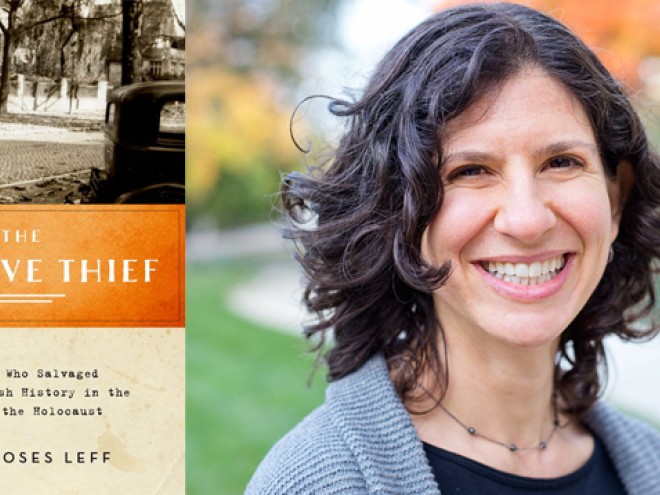Today, JBC reviewer M. Elias Keller writes about how a core Jewish concept helped him write his novel, Strange Case of Mr. Bodkin & Father Whitechapel.
 Although I’m a Jewish writer, my novel, Strange Case of Mr. Bodkin & Father Whitechapel, an adaptation of Dr. Jekyll & Mr. Hyde, is not a Jewish novel — but it was a deeply-rooted concept of Judaism that illuminated and clarified my story’s themes and direction.
Although I’m a Jewish writer, my novel, Strange Case of Mr. Bodkin & Father Whitechapel, an adaptation of Dr. Jekyll & Mr. Hyde, is not a Jewish novel — but it was a deeply-rooted concept of Judaism that illuminated and clarified my story’s themes and direction.
In 2009, I re-read one of my favorite novels, Dr. Jekyll & Mr. Hyde, and was especially intrigued by a passage that explains Jekyll’s potion as having “no discriminating action; it was neither diabolical nor divine; it but shook the doors of the prison-house of my disposition; and that which stood within ran forth.” Pondering this, I pursued the idea of writing about a morally-conflicted man taking the potion and creating a manifestation of his purely good side. And since financial scandals such as the mortgage crisis and Bernie Madoff were hot news topics, I settled on a banker for my protagonist: pitiless businessman by day, and, by aid of the drug, a saintly almsgiver at night.
Wanting to present thematic complexity that would give Mr. Bodkin and Father Whitechapel the best chance of standing as a genuine companion volume to Stevenson’s classic, the philosophical aspects of charity became a focal point. This also fit nicely with the historical fiction aspect of the novel, revolving around the Charity Organisation Society (C.O.S.), a 19th-century British institution that sought to systematize charity and aid those deemed most deserving, rather than most needy. Reviled in its time for ideas that are now rather commonplace (think: grant applications), the C.O.S. was strongly against street-charity, and thus, in my fictional world, the open-handed Father Whitechapel.
Underlying this examination of charity was an even more perplexing question: what is charity? What is the responsibility of the wealthy to the poorer classes? Although I was writing a story and not an essay, these questions were important to understanding my character’s decisions and personalities. For example, a scene in the book depicts an exchange between the Secretary of the C.O.S. (the real-life Charles Stewart Loch), and his friend Mr. Meade, a sweatshop-owning clothing manufacturer:
“Not come soliciting, have you?” Mr. Meade asked, with one of his characteristic guffaws.
“No, sir,” Mr. Loch replied, forcing a thin smile. “I have well given up that chase.”
“Well, it’s nothing against you, Charles,” said the other, as the two men settled into their seats. “But then I never went in for charity and the like. What is it, anyway, except more spent at the public-houses and rat-pits?” Mr. Meade harrumphed, rapping the arm of his chair. “The best form of charity, I say, is a sound economy. Everything else,” he added, flushing crimson, “is wasted money or self-serving balderdash!”
This little spirit of temper was somewhat of an affront to Mr. Loch, but being a man inured to criticism, he merely nodded stoically. “Perhaps so, Wallace, but a sound economy is built on liveable wages.”
Meade snorted, swirled his glass, and continued pontificating along a familiar line. “There will always be hunger, Charles. That is a fact of life. Natural selection and so forth. Some men thrive, and some go to the wall. I pay the wages that the market will bear.”
“Starvation wages, you mean,” Mr. Loch rejoined mildly.
“Starvation, sir, is a discipline,” Meade came back with; “and London’s poor would do well to have more of it.”
Somewhere along the way, I recalled an idea from Judaic studies: the definition of tzedakah as “justice” — not “charity.” (This definition does translate to the wider Christian world, as we see in St. Augustine’s counsel: “Charity is no substitute for justice withheld.”) And aligning charity with justice helped me to align the story with my own internal conflicts. It’s easy to drop some change into a cardboard box with the Star of David on it, or make a donation to the Jewish Federation, and accept that as tzedakah—“charity.” But it’s difficult, uncomfortable and time-consuming to truly confront the world’s inequalities and injustices.  In my novel, Mr. Bodkin discovers the fatal consequences of using a magic potion to “solve” his internal conflicts. In the real world, the stakes are smaller — yet the conflict is there, especially for those who must thoughtfully steward the money and time of donors. Consider the complexities of institutional charity, such as foundations contributing to cancer research/prevention organizations — while earning dividend income from stockholdings in companies like Altria (the parent company of Marlboro cigarettes).
In my novel, Mr. Bodkin discovers the fatal consequences of using a magic potion to “solve” his internal conflicts. In the real world, the stakes are smaller — yet the conflict is there, especially for those who must thoughtfully steward the money and time of donors. Consider the complexities of institutional charity, such as foundations contributing to cancer research/prevention organizations — while earning dividend income from stockholdings in companies like Altria (the parent company of Marlboro cigarettes).
Charity is something we can compartmentalize: we have our living expenses and luxuries, and our donations; we have our work and leisure times, and our volunteer sessions. But the question of justice permeates every moment of our lives and forces us to accept that true tzedakah cannot be donated or purchased. True tzedakah, true justice, must be demanded by every one of us, every day, with every dollar we spend and give.
M. Elias Keller grew up in Bucks County, PA and earned degrees in Anthropology and Urban Studies from the University of Pennsylvania. He has been a freelance and journalistic writer in Philadelphia and San Diego, as well as publishing short fiction in various literary magazines. Keller is the author of Strange Case of Mr. Bodkin & Father Whitechapel (GZI Productions, 2012), a companion novel to Robert Louis Stevenson’s Dr. Jekyll & Mr. Hyde. He lives in Philadelphia. www.meliaskeller.com.



